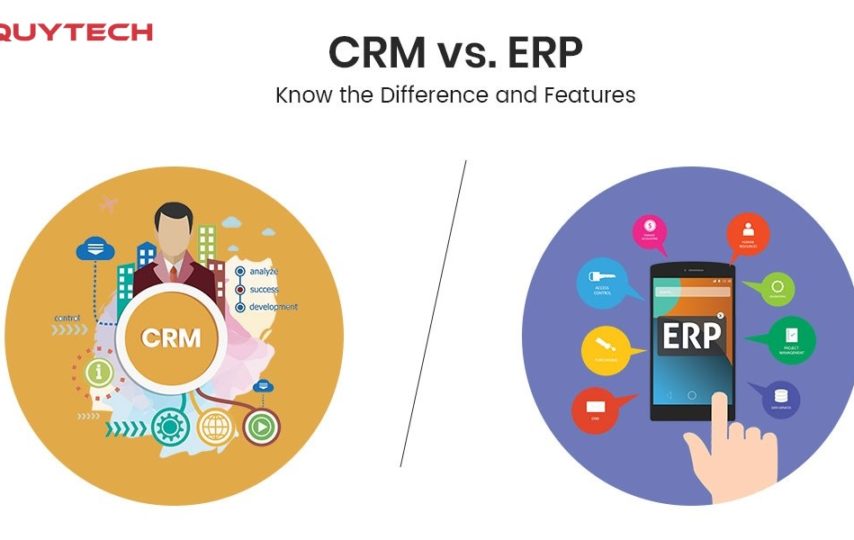CRM and ERP are the most used, talked about, and heard of software solutions in the market. Both of them are valuable business solutions that boost business’ revenue generation, automation, productivity, efficiency, and ultimately, profitability. While both the software depicts similarity in many ways, yet they differ in their core functionalities.
In this article, we will take a closer look at what CRM and ERP exactly are, and how are they different.
What is CRM?
Customer Relationship Management, more popularly known as CRM, helps you record and store all the information regarding customer interactions. The main objective of this software is to improvise your ability to connect with prospects and enhance the customer experience. Moreover, it centralizes the data, which is easily shareable across the organization.
Let’s consider an example here. One of your sales representatives has a call scheduled with a prospect. So, he will add more information about the prospect, i.e., contact details or notes about the conversation. Your marketing team can utilize this information to reach out to this prospect via cold emailing, sending personalized newsletters, and more.
With the right CRM in place, you can segment every aspect of your customer experience and work to enrich it. A CRM can be a part of an ERP system. You can ask your CRM development company to help you integrate your CRM solution into an ERP.
Let’s have a look at some of the functions of CRM –
- Determine customer behavior and analyze purchase patterns
- Offer high-quality customer experience
- Automate marketing campaigns
- Streamline the sales funnel
- Automate redundant tasks
What is ERP?
Abbreviated as ERP, Enterprise Resource Planning helps businesses improve the efficiency of their operational processes while reducing overhead costs. Unlike CRM, ERP focuses on all the aspects of a business – increasing visibility, streamlining processes, and reducing costs.
An ERP system interconnects specific business processes to standardize data throughout the company in real-time. Thus, you can focus more on your business and less on its operations. Here’s an overview of how ERP helps businesses –
- Update business process information in real-time
- Manage hiring requirements
- Maintain onboarding, payroll, and employee data
- Keep track of manufacturing and supply chain
- Process orders, invoices, and estimates
- Create enterprise-wide strategies
CRM vs ERP – What’s the Difference?
Let’s drill down on the difference between CRM and ERP –
| Features | CRM (Customer Relationship Management) | ERP (Enterprise Resource Planning) |
| Objective | Boost sales | Reduce costs |
| Targeted towards | Customers | Enterprises |
| Core Functionality | Records and stores every customer interaction | Manages and controls every business processes |
| Utilized for | Frontend activities like sales prospecting, email marketing, and more | Backend activities like payroll processing, employee management, onboarding, etc. |
| Benefits | Added revenueSales performanceEnhanced customer service | Greater financial controlsStreamlined business operationsIncreased productivity |
| Cost | Cheaper | Expensive |
While there a lot of similarities between CRM and ERP, both of them serve different purposes. To increases sales and profit, you need a CRM. Whereas, ERP is essential to streamline overall business operations and cut down costs. So, if you are in a dilemma about which software solution your business needs, well, it requires both. When CRM and ERP work hand in hand, they maximize your business growth.
CRM or ERP – Which One Should You Choose?
When it comes to making a choice between CRM and ERP, you must consider the following three factors –
- Needs
Though both share some common purposes, CRM and ERP meet different needs. You can leverage CRM if you are looking to boost your sales figures. On the other hand, ERP is built to help you reduce the overall costs for each sale you make. So, analyze your needs clearly before you boil down your choice to either of them.
- Investment
Well, neither of them is cheaper. But when compared to each other, CRM is cheaper than ERP as ERP systems call for a large investment.
- Scalability
CRM and ERP scale differently. While CRM tends to offer greater benefits to small and medium-sized businesses, ERP is highly suitable for large and complex organizations. CRM provides businesses with room to grow; thus, enabling to increase sales figure. ERP comes with a lucrative cost-cutting and efficiency-driven model, offering organizations high returns on their investment.
If you are looking to avail of the benefits of both the software solutions, you must choose an integrated CRM and ERP system. Alternatively, you can also start with a CRM and then integrate it with a relative ERP system.
But, is CRM right for your business?Well, to gauge the working of CRM and what benefits it can bring specifically to your business, you can feel free to connect with the CRM experts at Quytech. Being a leading mobile app development services providing firm, Quytech can help you determine the competition, analyze the opportunities, and maximize your business growth in every possible way.












